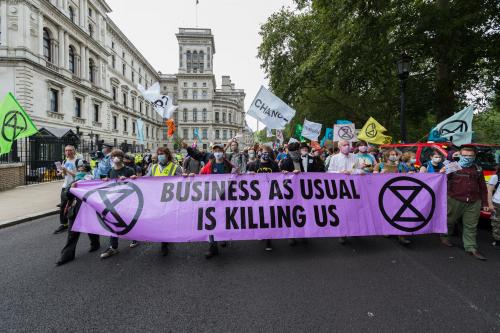Humanity subsidizing 'our own extinction,' warns study
World governments are spending $1.8 trillion annually to support fossil fuel emissions, deforestation, water pollution, and other harms to biodiversity and the planet.
- Opinión

Releasing a new study showing that world governments spend at least $1.8 trillion annually to subsidize activities which worsen the climate crisis, global subsidies experts on Thursday said leaders must eliminate or redirect the financial supports as part of an ambitious Global Biodiversity Framework at an upcoming summit in China.
The B Team and Business for Nature, two organizations that push businesses around the globe to adopt sustainable practices, supported the study, titled Financing Our Survival: Building a Nature-Positive Economy Through Subsidy Reform.
According to the authors—Doug Koplow of subsidy research firm Earth Track and Ronald Steenblik of the International Institute for Sustainable Development—a lack of transparency regarding the use of subsidies means that the amount of government money being spent on the destruction of nature could be much higher than the research shows.
"Nature is declining at an alarming rate, and we have never lived on a planet with so little biodiversity," said Christiana Figueres, former executive secretary of the United Nations Framework Convention on Climate Change (UNFCCC) and a member of The B Team. "At least $1.8 trillion is funding the destruction of nature and changing our climate, while creating huge risks for the very businesses who are receiving the subsidies... Harmful subsidies must be redirected towards protecting the climate and nature, rather than financing our own extinction."
The report identifies at least $640 billion in annual fossil fuel subsidies, $520 billion used by the agricultural sector, $350 billion in water management and wastewater infrastructure, and $155 billion subsidizing logging and unsustainable forest management, all of which account for the majority of annual subsidies.
The equivalent of at least 2% of the global GDP is being spent by governments to finance water pollution and air pollution, soil erosion, deforestation, biodiversity loss, planet-heating fossil fuel emissions, risks to ecosystems in oceans and waterways across the globe, and other harms to nature and humanity, the authors said.
To help finance climate crisis mitigation measures in the Global South—as wealthy nations pledged they would in 2009, promising $100 billion annually—and redirect government funds toward a transition to renewable energy and a reversal of nature loss, hundreds of billions of dollars in subsidies must be eliminated or repurposed, according to the report.
A draft of the Global Biodiversity Framework calls for $500 billion per year in reformed subsidies—a target that "needs to be strengthened" in April at the U.N. Biodiversity Conference (COP 15) in Kunming, China.
"The case is clear: reforming the $1.8 trillion a year of subsidies that are harming the environment could make an important contribution towards unlocking the over $700 billion a year needed to reverse nature loss by 2030 as well as the cost of reaching net zero carbon emissions by 2050," wrote the authors. "This needs to happen alongside aligning all private financial flows to nature-positive and increasing public and private finance to deliver innovative financial solutions that help protect, restore, and conserve nature."
"With political determination and radical public-private sector collaboration," they added, "we can reform these harmful subsidies and create opportunities for an equitable, nature-positive and net-zero economy. To do so, we must bring awareness, transparency, and disclosure on subsidies from both governments and business."
Ahead of the biodiversity conference in April, said Business for Nature, negotiators must strengthen the Global Biodiversity Framework draft by including a commitment to reform "ALL harmful subsidies, including indirect and direct incentives."
"Climate action is at a crossroads, in part because of the large scale of public money flowing to harmful industries and practices," said Mary Robinson, former president of Ireland and member of The B Team. "We need to see thorough subsidy reform from governments and businesses, with social and environmental considerations at the heart, to ensure a just and equitable transition for all."
https://www.commondreams.org/news/2022/02/17/humanity-subsidizing-our-own-extinction-warns-study
Del mismo autor
Clasificado en
Clasificado en:
Crisis Ambiental
- Paula Bianchi 07/04/2022
- Leonardo Boff 05/04/2022
- Gabriela Ramírez, OBELA 04/04/2022
- Gabriela Ramírez, OBELA 04/04/2022
- Aviva Chomsky 28/03/2022








